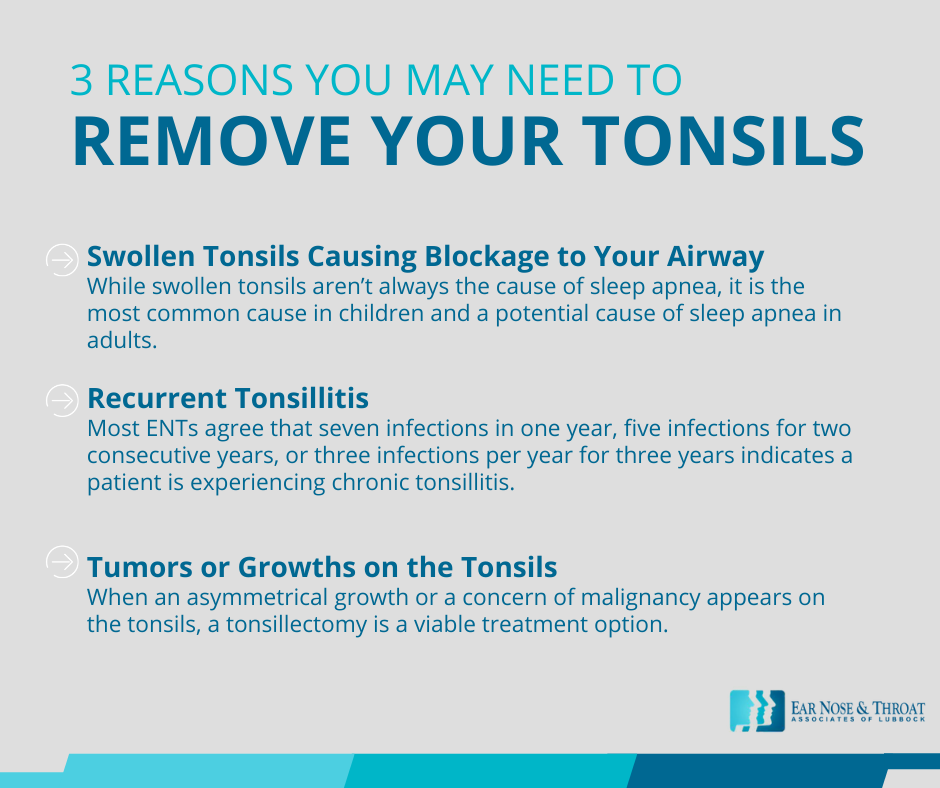The Top 3 Reasons You May Need to Remove Your Tonsils

Most people don’t mind having a little extra protection — especially when it comes to their health. We wear a jacket when the temperature drops and the wind picks up. We apply sunscreen for our time outside. We take supplements or vitamins to boost our immune systems. We get vaccines to prepare our bodies for potential threats.
Typically tonsils act as another form of protection. This lymphoid tissue in the back of the nose and throat works to fight off infections that enter the nose and mouth before they get to the rest of the body. They stop viruses and bacteria before they make it fully inside.
But sometimes, tonsils start causing more problems than they prevent. In these cases, there may be a reason to remove tonsils depending on the exact problem and the tonsils it’s affecting.
Types of Tonsils
There are actually three different types of tonsils.
The Palatine tonsils at the side of the throat are the tonsils that we typically remove during a tonsillectomy. When people casually refer to a tonsillectomy, these tonsils in the throat are what they’re referencing.
The adenoids, or tonsilla pharyngealis, are the tonsils at the back of the nose. These are most commonly removed in children and tend to shrink with age, but adults occasionally need these removed as well.
Lingual tonsils (tonsilla lingualis) located on the back of the tongue, are almost never removed. Only rare occasions such as recurring infections after a tonsillectomy or specific types of sleep apnea result in the removal of these tonsils.
Depending on the issue the patient is experiencing, we assess if removing one of these types of tonsils will solve their problem.

What Are the Reasons to Remove Tonsils?
While the tonsils are supposed to improve our health, for some, the tonsils are the source of their problems, particularly when they become enlarged. If you’re experiencing one of these symptoms, a tonsillectomy may be your solution.
1. If swollen tonsils cause blockage to your airway
Swollen tonsils may be the explanation for why you’re not sleeping well at night. Perhaps you’ve wondered why you (or your spouse or child) snore loud enough to rattle the walls, or you often wake up in a gasp. These are signs of sleep apnea, a condition when breathing abruptly starts and stops during sleep. While swollen tonsils aren’t always the cause of sleep apnea, it is the most common cause in children and a potential cause of sleep apnea in adults.
Sleep apnea is a serious health concern that needs to be addressed. For some, a tonsillectomy proves to be the solution.
2. If you experience recurrent tonsillitis
No, a sore throat by itself is no reason to remove tonsils, but when tonsillitis occurs repeatedly over the course of a few years, your doctor may recommend a tonsillectomy. Most ENTs agree that seven infections in one year, five infections for two consecutive years, or three infections per year for three years indicates a patient is experiencing chronic tonsillitis.
Patients with tonsillitis may notice symptoms such as extreme bad breath, tonsil stones, chronic sore throats, and drainage from the tonsils. If you’re experiencing these symptoms regularly, a tonsillectomy may be the solution your ENT recommends. (Related: The Parent’s Guide to a Quick & Smooth Tonsillectomy in Children)
3. Tumors or growths on the tonsils
Anytime we notice an abnormal growth in the body, removal is a consideration. When an asymmetrical growth or a concern of malignancy appears on the tonsils, an adult tonsillectomy is a viable treatment option. Keep in mind, this is a rare occurrence and not a frequent reason to remove tonsils.
Is Medication an Alternative to Surgery?
If your doctor recommends a tonsillectomy, there’s not typically a medication alternative. As ENTs, we always try medical treatment before we opt for surgery. If the infection continues to return, the patients would need to continually take antibiotics. While antibiotics will fight the infection, the repeated use of these medications wears out your body and gut.
When we get to the point of talking about the option of a tonsillectomy, we’re beyond the point of a one-off infection that we can quickly remedy with medication. At this point, if you choose to keep your tonsils, you’re opting for long-term antibiotic use, which can be difficult to handle.
Are There Any Potential Complications?
Bleeding is the most common complication that follows a tonsillectomy. As the throat heals, it forms scabs in the area where the tonsils were removed. If patients become dehydrated or eat foods that irritate the throat, these scabs can come off prematurely and bleed. In some cases, this leads to an additional procedure.
Other complications following a tonsillectomy are extremely rare.
What Is the Recovery Process After the Procedure?
Most people recover in about two weeks following their procedure. For others, it may take more time to fully heal. Plan on about two weeks away from work with a restricted diet and limited activity. However, once you heal, you’re not just back to normal — you’re much better than you were.
Dr. Cuthbertson is a physician at Ear Nose & Throat Associates of Lubbock. He joined the team at ENT Lubbock from Houston, where he was chief resident of the prestigious Bobby R. Alford Department of Otolaryngology at Baylor College of Medicine. He is board certified in Otolaryngology and Head & Neck Surgery and has quickly built a reputation, not only as an extremely skilled surgeon, but as an approachable and compassionate clinician adept in the newest standards and technologies. Learn more about Dr. Cuthbertson.
Categories:








